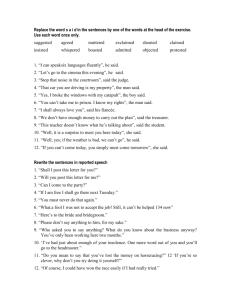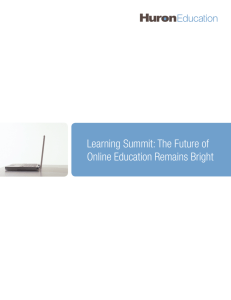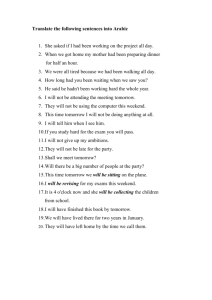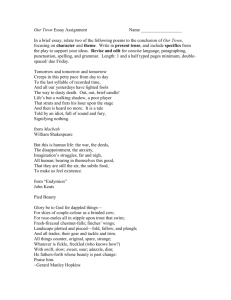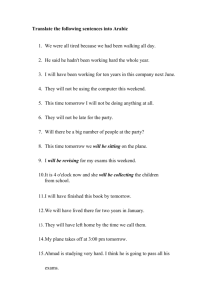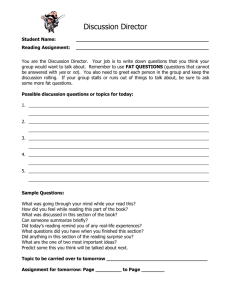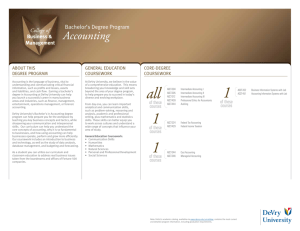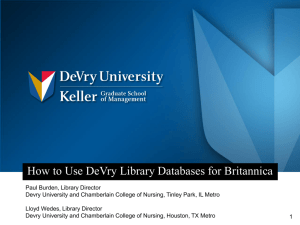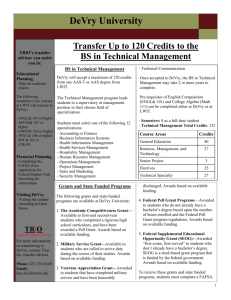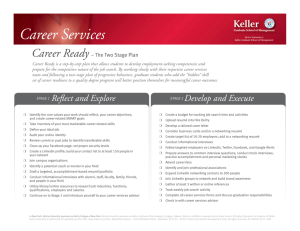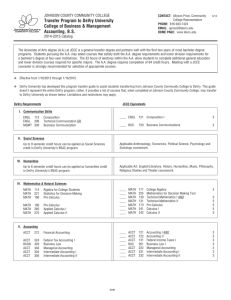Featured Writer Guidelines, DeVry University, Know How for a New
advertisement
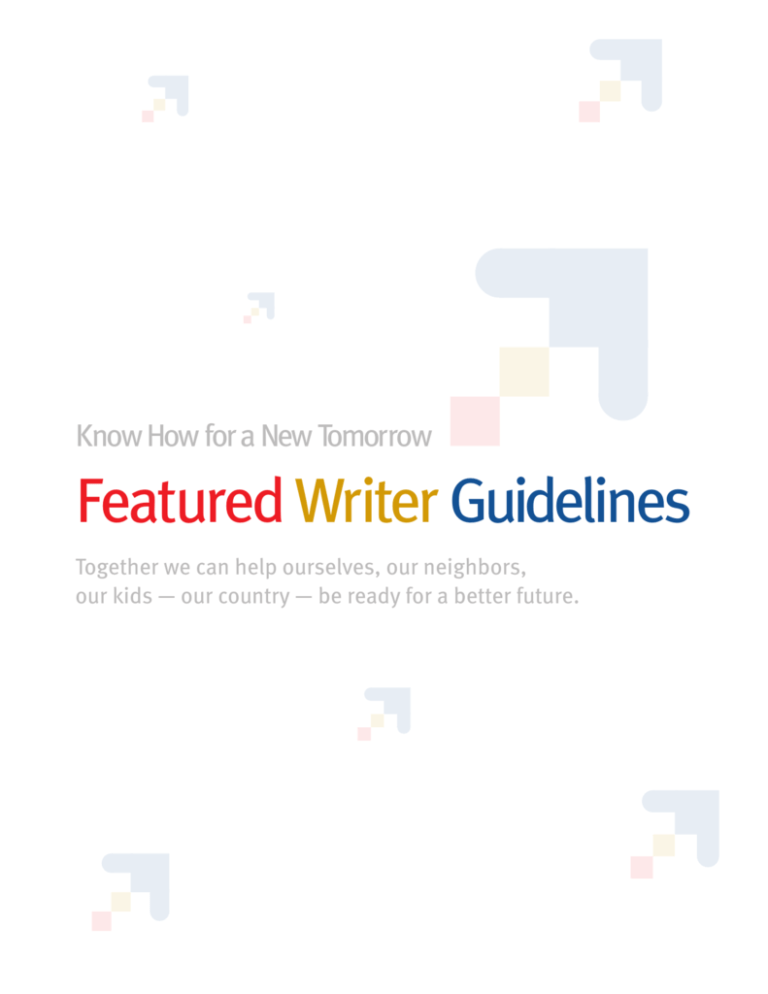
Know How for a New Tomorrow Featured Writer Guidelines Together we can help ourselves, our neighbors, our kids — our country — be ready for a better future. TABLE OF CONTENTS Welcome to the Conversation ............................................................... 3 Why Know How? ...................................................................................4 How Does Our Hub Work? ......................................................................8 What is Your Role as a Featured Writer? ............................................... 14 FAQs ..................................................................................................20 2 WELCOME TO THE CONVERSATION You’re part of a growing community dedicated to helping people in this country get ready for all that our future could bring and the careers that are coming. Whether you’re a professor or a student, a member of the alumni association or a professional partner, you bring a certain unique expertise to this important conversation. We value your insights. We also understand that your life is full. That’s why we’ve created this guide to help you better understand the purpose of Know How for a New Tomorrow and your role as a contributing writer on the subject. We are honored to feature your work. You posts will bring to life significant ideas, provoke crucial questions, and offer necessary inspiration. By sharing your voice, you’ll help provide the Know How we all need for a New Tomorrow. 3 WHY KNOW HOW? 4 “65% of today’s grade school kids will end up at jobs that haven’t been invented yet.” —United States Department of Labor: Futurework — Trends and Challenges for Work in the 21st Century “By 2025 we could have 20 million jobs without enough college graduates to fill them.” —Rose, A.P. (2011, June 26). The Undereducated American. Retrieved September 4, 2012 from Georgetown University: Center on Education and the Workforce. http://cew.georgetown.edu/undereducated/ 5 With a new high-tech infused global economy, the career landscape is changing. In order to find a job in this landscape, people are going to have to keep up with the changes. This will take a special kind of Know How—Know How in emerging fields like Cloud Computing, Sustainability Management, Digital Forensics, Healthcare Technology and Robotic Engineering . . . and in fields that are rapidly changing, like Accounting and Finance. 6 At DeVry University we’re preparing students with an education that is responding to careers that are available, and anticipating careers to come. So the next generation, and our country, will be ready for the one thing we need, now more than ever: Know How for a New Tomorrow. Know How that you already have. Know How that you have so generously agreed to share. 7 HOW DOES KNOW OUR HUB WORK? 8 We’ve created this content hub so that all kinds of people can learn from the Know How you’ve worked so hard to gain, everyone from prospective students to high school teachers, counselors and parents. The hub includes articles, videos, infographics, slide shows, and photographs that relate directly (and sometimes metaphorically) to issues of the skills gap — or a “know how gap” — and the growing careers in our new economy. Our goal is to highlight content that is both engaging and inspiring, provocative and accessible, and to evoke our forward-thinking purpose. 9 Our ever evolving hub: 10 In a sense, our Know How hub functions as a kind of online journal or magazine, with content that explores the issues, the careers, and the people who are already involved in growing fields of the future. Your article may address the issues, the careers or both. And because you are a key player in the Know How community, you could also be featured as a person to know on our Hub. Here are a few excerpts from previous featured writer posts. 11 Cyber Competitions Prepare the Cyber Security Professionals of Tomorrow By Bob Bunge, Associate Professor, College of Engineering and Information Sciences, DeVry University In fact, as a country we are coming to understand how important it is that we train real-world and high-tech warriors. With Congress currently debating the best approach to cyber security, it is clearly urgent that we quickly learn how to safeguard our virtual information. Anyone who has suffered identity theft can attest: as a nation, as individuals, we need protection from crime and espionage online. http://www.devry.edu/know-how/cyber-competitions-prepare-the-cybersecurity-professionals-of-tomorrow/ 12 10 Cyber Security Tips for Small Businesses By Dr. Tahereh Daneshi, Professor, Information Systems Management, DeVry University’s Keller Graduate School of Management According to the Federal Communications Commission, theft of digital information has become the most commonly reported fraud, surpassing physical theft. It is important to note that if faced with an attack, your business may be liable by the Federal Trade Commission if appropriate protections are not in place to secure confidential information and data for your employees, customers and business partners. Along with technical controls by your IT staff, protection should also include physical and administrative controls when protecting your resources. Here are a few simple, cyber security tips that can help protect you, your employees and your assets. And, these practices don’t require any technical skills or an entire IT department. http://www.devry.edu/know-how/cyber-security-tips-for-small-business/ TAHEREH PHOTO 13 WHAT IS YOUR ROLE AS A FEATURED WRITER? 14 You have been invited to contribute to Know How for a New Tomorrow because of your particular expertise about an increasingly important subject. In writing about the work to which you have devoted a significant portion of your life, we hope that you will feel entitled to speak with accessible confidence. Whether you are a professor, a student, or a business professional, your contribution has the potential to make a difference to our viewers. In articulating an experience they may not have had, a career path they may just beginning to imagine, you are extending Know How needed for today and tomorrow. 15 So how can you help get your important message across? Here are a few specific guidelines that we hope will help you maintain your unique voice and vision, and at the same time help us integrate your featured post with the rest of the Hub content. 16 Please keep in mind the following guidelines as you craft your post. 1. Voice and tone: We value you as an authority. We want you to write with authority and show your passion for and expertise in the subject matter. Be conversational. Keep in mind that while you may be writing about an academic or technical subject, most of our viewers are not academics or techies (yet). It might help to imagine your audience as a prospective student or job seeker who possesses a keen and open mind. At the same time, if you are a student or have a tendency to write in a colloquial, easy-going manner, try to balance your engaging style with a professional sensibility. Another technique, once your post is written, is to try reading it aloud to someone who is not in your field. When your important insights are clear to this listener, they will most likely be clear to our readers. 17 Please keep in mind the following guidelines as you craft your post. 2. Word count: We ask that you do your best to write a post of 600 to 900 words. Less is frequently more on the Internet; research shows that viewers focus better when posts are not too wordy. 3. Formatting: Please send your post as a word document, double-spaced, 12 point type. Please include all source citations (MLA version is fine), with links to any content retrieved from the web. Unless your post is particularly brief or focused, we encourage you to organize your material into well-structured sections that incorporate guiding section titles. Organizing your piece into tips or subheads also makes for better readability on the web. 4. Links: If you cite sources in your piece and/or want to link to other information, please include these hyperlinks if you are able. 5. It probably goes without saying: Please do proofread your work for grammar, spelling, and punctuation. Also make sure and include a title that distills the essential content of the article in an interesting, informative way. 18 6. Further Opportunities for Sharing: Because we believe in your message, and in the related content of Know How for a New Tomorrow, we’ll be sharing your articles across DeVry University’s social channels, including Facebook, Twitter and Google+. We encourage you to share your featured post through your own social media accounts — either by sharing the DeVry post or by writing your own. Here are a few examples of such posts: (Posts should be 140 characters max, without link, but including spaces) “Keep looking up; the cloud is where your career is going!” I share emerging job trends in cloud computing at Know How for a New Tomorrow: (insert link to post) (Tweets should be 110 character max, without link, but including spaces) 1000s of cloud computing #jobs listed on major career sites daily! Read my post & #KnowHow you can be ready: (insert link to post) (Posts should be 140 characters max, without link, but including spaces) Want to know more about the 1000s of jobs posted for cloud developers each day? Read my featured article at Know How For a New Tomorrow: (insert link to post) 19 FAQs 20 1. How much time do I have to write my post? The goal is for you to provide a first draft within two weeks once the topic is determined, but we’ll work with you to set manageable deadlines. We understand you have many teaching commitments and other professional endeavors, so if you aren’t able to meet a deadline, please let us know. 2. Do I include my own images, graphics, and illustrations? We’ll want to feature a picture of you with the blog post. Please provide us with a headshot or let us know if you need assistance securing one. We welcome charts or graphs that complement the message or topic you are covering in the post. If there are images you’d like to be considered please ensure we have appropriate rights to post and share on the web. If you’re not sure, we’ll help you. 3. Where do I send my post once it’s written? Please provide the first draft to Katie Patterson with MSL Group at: katie.patterson@mslgroup.com. 4. Who may I contact with further questions? Katie Patterson with MSL Group and/or Kate Lorenz with Leo/Arc can be contacted with any questions. Katie Patterson: katie.patterson@mslgroup.com Kate Lorenz: kate.lorenz@arcww.com 21 5. What should I include in my bio? The bio should include basic information on your title at DeVry University, the campus where you teach (if applicable), other current professional positions and endeavors, previous experience and degrees secured. We also would like to know any recent papers, articles or books published. Please see two examples below. Robert (Bob) Bunge is an associate professor in the College of Engineering and Information Sciences at DeVry University. He has nearly ten years of teaching experience in computer information systems, network security and simulation development. As a cyber security and cloud computing expert, Bunge has presented on various subjects at numerous events, including the NWSec Conference and the Washington Association for Skilled and Technical Sciences Conference. Ed Hill is a professor in the College of Engineering and Information Sciences at DeVry University in Miramar, Fla. Before joining DeVry in 2002, he served as the vice president of information systems at FSD, Inc. in Miami, Fla. Hill holds a bachelor’s degree in accounting from Southern Methodist University and a master’s degree in computer information systems from the University of Miami. 22
